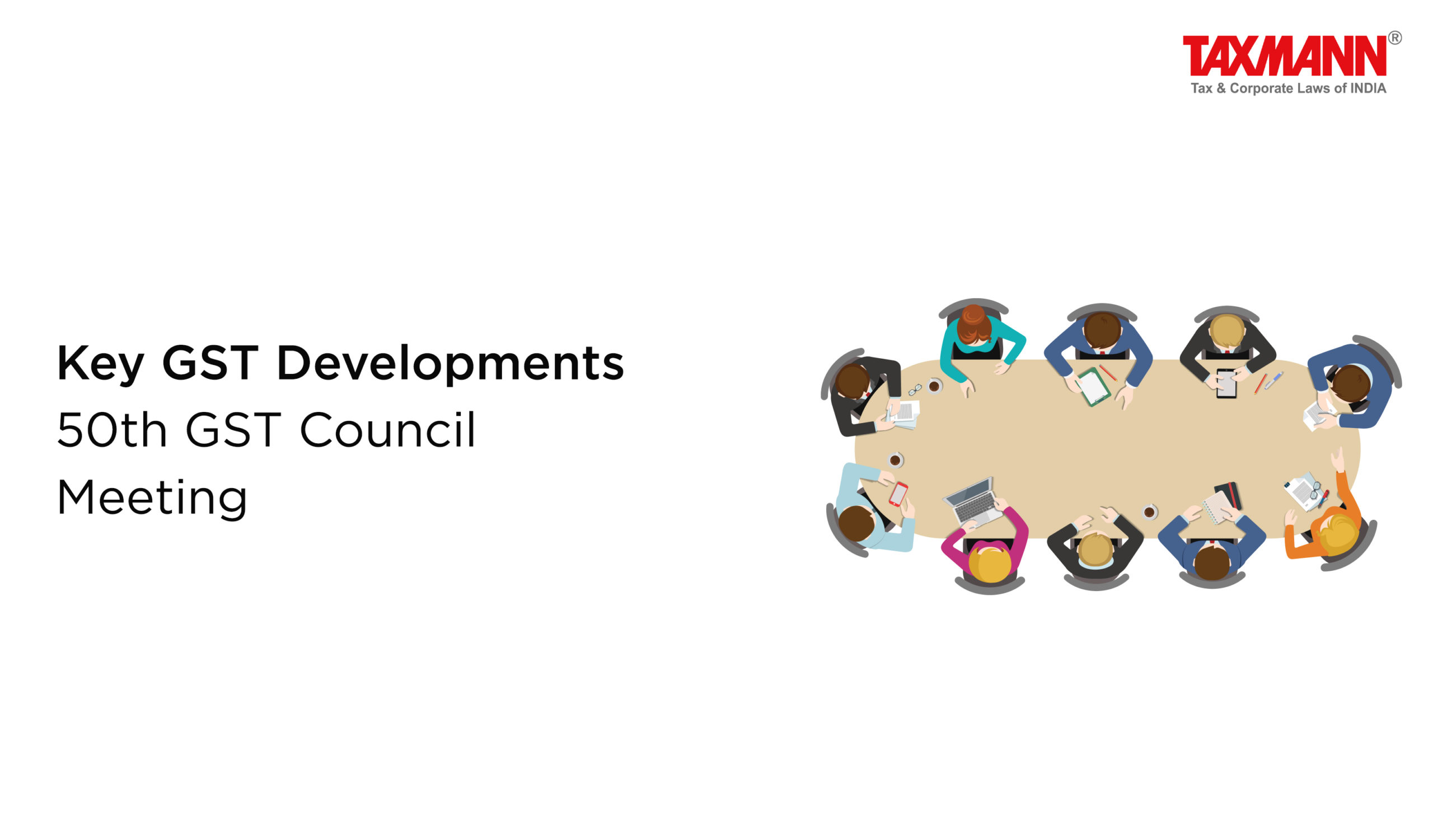Key GST Developments | 50th GST Council Meeting
- Blog|News|GST & Customs|
- 3 Min Read
- By Taxmann
- |
- Last Updated on 13 July, 2023

Kishore Kumar – [2023] 152 taxmann.com 248 (Article)
The 50th GST Council took place on 11 July 2023 in New Delhi. The meeting which was headed by Hon’ble Union Finance Minister Nirmala Sitharaman and attended by Group of Ministers (GoM) is a landmark meeting, a milestone which indicates the success of cooperative federalism and establishment of Good and Simple Tax. The GST Council has taken some very important decisions on long pending issues to bring more clarity in taxation regime and fostering ease of doing business. These changes are largely classified into three broad buckets:
I. Changes with regard to taxability and GST rates;
II. Changes in line with trade facilitation measures; and
III. Procedural changes to safeguard government revenue from fake registration and bogus credit claims.
This article aims to discuss some key changes that took place in the Council meeting.
Changes with regard to taxability and GST rate
- The first and foremost development is with regard to taxability of online gaming. The GST council has proposed to levy GST @ 28% on the full value of gaming at par with levy on betting, gambling and lottery. India’s gaming industry which has witnessed a remarkable growth post the pandemic and is growing at a CAGR of 28-30% is saddled with the decision with regard to its taxability. India is probably the only Country world wide to levy GST on full face value on all categories of online games. The blanket proposal to levy GST on full face value on online gaming will possibly put an end to the sub-judice debate of ‘game of skill’ vs ‘game of chance’. This change will bring game of skill at par with wagering contracts which are in the nature of gambling and betting. From a revenue perspective the proposed amendment may significantly contribute to the Government exchequer and will make states like Goa and Sikkim important from revenue generation perspective. Implementation of this change will require a host of amendments under the GST law especially with respect to the definition and taxability of actionable claims under GST. What remains to be seen is whether this change is going to apply prospectively or will have a retrospective impact.
- The GST council has clarified that supply of food and beverages over the counter in a cinema hall will be liable to GST @ 5% (without input tax credit) as supply of restaurant service. Also, where the food was supplied as a part of bundled service of movie tickets then such supply will be taxable as a composite supply of service where the principal supply being movie ticket. This is a welcome step which will settle long pending disputes on taxability of over the counter supply of food and beverages in a cinema hall.
- The GST Council has proposed to levy compensation cess of 22% on all categories of motor vehicles irrespective of whatever name they are called so long as these fulfill three conditions namely length exceeding 4000 mm and engine capacity above 1500 cc and ground clearance (in unladen state) of 170 mm and above. This decision will make multi-utility vehicles (MUVs) dearer to the pockets of end consumer. This change is likely to settle disputes with regard to differential compensation cess issues basis the categorisation of vehicles between sports utility vehicles (SUVs) and MUVs.
- The GST Council has proposed to come up with capacity based taxation and special compensation scheme for sin goods such as pan masala, tobacco and other similar items in line with the provisions under the erstwhile excise regime. The manufacturers of these sin items are required to follow registration of machines mechanism and filing of special monthly return as may be notified. Also, there is a proposal to restrict IGST refunds on exports of pan masala, tobacco and similar products.
Click Here To Read The Full Article
Disclaimer: The content/information published on the website is only for general information of the user and shall not be construed as legal advice. While the Taxmann has exercised reasonable efforts to ensure the veracity of information/content published, Taxmann shall be under no liability in any manner whatsoever for incorrect information, if any.

Taxmann Publications has a dedicated in-house Research & Editorial Team. This team consists of a team of Chartered Accountants, Company Secretaries, and Lawyers. This team works under the guidance and supervision of editor-in-chief Mr Rakesh Bhargava.
The Research and Editorial Team is responsible for developing reliable and accurate content for the readers. The team follows the six-sigma approach to achieve the benchmark of zero error in its publications and research platforms. The team ensures that the following publication guidelines are thoroughly followed while developing the content:
- The statutory material is obtained only from the authorized and reliable sources
- All the latest developments in the judicial and legislative fields are covered
- Prepare the analytical write-ups on current, controversial, and important issues to help the readers to understand the concept and its implications
- Every content published by Taxmann is complete, accurate and lucid
- All evidence-based statements are supported with proper reference to Section, Circular No., Notification No. or citations
- The golden rules of grammar, style and consistency are thoroughly followed
- Font and size that’s easy to read and remain consistent across all imprint and digital publications are applied



 CA | CS | CMA
CA | CS | CMA
